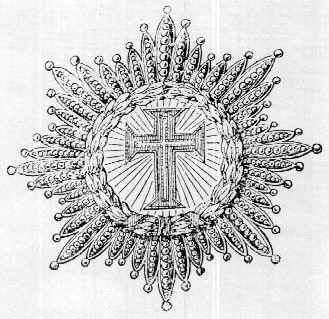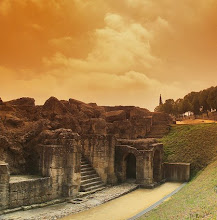It is a book that undos all the trite expressions, lies and tricks of all kinds by which we are overwhelmed and by means of which we are tried to be convinced about the Islamic heritage of Spain and the "old" coexistance between Muslems and Christians on Peninsular soil.
First and foremost, in order to hold (with solid grounds) the good relationship -present and future- bewteen Spaniards and the inhabitants of Muslim countries, it is necessary to accept a certain knowledge about history, on both sides, for it will always be better to learn from past mistakes and limitations than to repeat them through ignorance of the causes that gave rise to it.
"The Arabs cherish a completely unreal picture regarding Spain, which they plant with nonexistence mosques or phantasmagoric "poetizations" of "al-Andalus"And it is intended to make the Spaniards believe that there was a peaceful coexistence and cultural symbiosis in the medieval ages and in its extention until the expulsion of the Moriscos while actually the causes and factors for "the" clash (anti-biosis), mutual ignorance and the forging of hostile and distorted pictures of each-other have been predominant in times crammed with fights and clashes since the Islamic invasion of Hispania.
By Saying that, the aim is not denying the obvious -that there were varied and outstanding elements of intelectual character - often of Hellenistic stock-, of agricultural technology, of craftmanship, of the material or administration life from Al-Andalus to the Northern Kingdoms and, in the intellectual aspect, to the Western World in general, especially in the Early Middle Ages up to the XII century, but that's something - the incorporation of individual features from of a different structure or socio-cultural system, which Islam has also widely performed and something else is stating that there was a mixed system in which everybody melted and coexisted in the same way of life and perception of the world.

"Hither and thitheralways the Moorish echos
of the prickly pears"
... as the poet said. And the dreamy kid from Jerez, Motril or Córdoba was captivated by the evocations of the far-off forebears who left such marks, living marks, not on the stone; then he consults any encyclopedia -published in installments- and reads -skeptical and puzzled- that prickly pears come from the New World (from México, the impersonal press points out): thus the commonplace of the Moors-lovers' rhetoric started cracking. And, nevertheless, on both sides of the Strait, prickly pear proliferates. There is still something to do: establishing in which direction it crossed the sea. And on what date: not before, of course, the Reconquist of Granada.
Being every hope of Moorish racial survival ruled out, where does the hackneyed subject -accepted with such a suspicious unanimity- settle? All signs appear to point at the geographic closeness to Morocco and the historical and indisputable piece of information that a part of Andalusia has been the last Muslim territory in the peninsula: it is on that basis (of such interpretation) that the moorishness of Andalusia is settled. The rest: food, dress, everyday habits, man's attitude towards enviroment have few points in contact, overall, with Moorish survivals, and if they coincide is rather because of the common Mediterranean roots than because of that sensational discovery known as "influence".
What about the language? One of the mainstay of the Andalusian moorishness -and Spanish in general- is usually the presence of range of vocabulary adopted from Arabic. And perhaps, it's use reminding that those words appear in the whole peninsular geography (who would say that Orense is Moorish because terms like "almofía, regueifa, or many others" are used in it?), and let's not forget that in Castilian, as in every language, the adoption of individual vocabulary does not affect either the general structure or those words (numerous, of course, most of them very little-used though), which have not produced substantial modifications in the mentality of the speaker: Do we feel especially Frenchified for the bright gallicism like garden, bayonet even though their entry is much more recent than Arabian vocabulary's?

In relation to the foundation of the pretext, with which imperial Spain justified its Mediterranean expansion by means of Mártir de Anglería; the country was not the only one that, in the course of the period between the XV century to the present day, planned and carried out a colonial attempt, as it is common knowledge: as soon as the European powers had the chance, they developed similar expansionist plans and- for their part- theorized to seek the indispensable historical and moral legitimacy which, at least before their people, would serve their plans.
On a cultural or ideological level, it’s not worth extending too much by listing –exhaustively- the endless list of -distortions, information manipulations, lack of understanding (even in good faith) or lack of respect to the “colonized” people -which are denoted in writings, accounts of journeys, of whom came into contact with Asian or African cultures during the XIX century.
But Eurocentrism is not to be used as a an alibi, a balm that wipes out all the other people’s responsabilities and that even prevents us from the mere practicing criticism or the study of other societies if we don’t appear before them on our knees and apologizing for our ancestor’s acts. Let’s turn the argument around, not to legitimize faults from the past but not to conceal the present ones, whoever may make them. And in this respect, there is no option but admitting that the outrages or crimes perpetrated by societies only differ from each-other in quantity (for having better destructive or coercive resources).
Amongst present Spaniards, the most prominent denounces of Eurocentrism have come perhaps from R. Sánchez Ferlosio with his attacks – excessive and not original at all, in our opinion- to the colonization of the Indies; and J. Goytisolo, who usually base his defense of Arabs and Muslims rather on other societies flaws than on the virtues of the society he backs. Leaving aside the first case because of how much it involves that particular Spanish sense of self-destruction (which seems as though it is a special hallmark of our culture) when not major efforts that distract attention and take eyes off other less ethical attitudes of the novelist.
Goytisolo: “Spain was the first modern country that solved the problem of races in a categorical way, hounding, persecuting, stealing and finally driving out the Moors and the Jews en masse with the purpose of protecting the unblemished purity of the majority caste”.
It doesn’t appear that the historical analysis points at the search for racial purity but the political standardization that absolutist states- back then in formation in Europe, and it’s undeniable that it was the multidenominational heterogeneity, rather than the racial one, that was opposed -head-on - to such projects. Minorities were serious obstacles to the consolidation of absolute states. Hence, their wiping out; however, similar acts arose and have arisen in Europe and –also- in Islamic states. Both Protestants and Catholics suffered –depending on countries and periods- pressure, exile, death (England, France, Switzerland, Germany, Spain were pitiless to the minority sects) without the sect’s racial component intervening in some way, given that it was the connationals being persecuted.
But there is more. Religious tolerance, or rather pluridenominationity, which is a subsequent attainment to the Reinassance, doesn’t always mean progressivism or progressive motives. The penetration of Protestant sects fostered and- literally- paid by the American CIA in Ibero-America is an good illustration of the exploitation that can be done of religious feelings, with so little justifiable aims like splitting up a society into factions – permanently conflicting because of a secondary problem like religious faith: The Lebanon cases, North Ireland and Yugoslavia are well expressive on the matter. And even at the risk of falling into a state of the mortal sin of dumb progressivism, we assert that unification – we insist- more political than religious undertaken by the Catholic Monarchs and continued by their successors saved Spain from very serious internal conflicts that still drag on in countries such as Turkey, for instance. And in the end, it was turned to the same reprehensible and brutal procedure in such countries: the expulsion and extermination of the Armenians were carefully forgotten by J. Goytisolo. The edifying Ottoman practice of enslaving its own subjects doesn’t ring a bell with him.
Let’s indeed treat everybody equally and perhaps let’s agree on the fact that the history of disgrace is – like Borges suggested- universal and nobody can escape from it. In any case, we reject one-sided self-flagellation if at the same time the “third-worlders” (that vague term that encompasses both people of the province of Buenos Aires, and Malays) don’t get off their eternal victim mentality and launch their own self-attack, which is seriously needed in the dominant Arab society, without dodging their responsibilities and without using other people’s ones as means of justifying as many mistakes – to put it softly- as they just made or make.
You, who never made so much of your skin colour, suddenly find yourself –via your cutaneous pigmentation- held responsible for the bomb of Hiroshima, even though you were born one month later than the dropping by a certain military power and through the process of a president’s order, who also had a name and surname. The syllogism would be: the white race dropped the atom bomb; it happens that I am white therefore I dropped the atom bomb. Could we be branded as Eurocentric because we do not enthusiastically enroll on this way of reasoning?
We wouldn’t want to go into the enumeration of the systematic casuistry of parallel serious crimes in various societies, but perhaps it would not be superfluous to jog our memories, starting by speaking about ourselves. Our faults, the first ones: Everyone knows the carnages and atrocities carried out by the Spaniards throughout the American colonization but – Is pulling the Chancas and Yungas prisoners to pieces in their hundreds, in their thousands and filling their skin with ashes,- like Pascual de Andagoya o Cieza de Leon related -, legitimized for being the Inca power the author? Does their indigenous status perhaps authorize or, at least, encourage the obscurity of such practices? Are perhaps the crimes of an extracontinental conquistador (the Incas of Cuzco were as strange for the Cañaris or the Chancas like Europeans) morally worse than an indigenous conquistador’s? And, incidentally, identical news about skinnings are depicted by Ibn Battuta in India, -Muslims’ doings- albeit tearing human beings to shreds and using their skin is not considered correct by the legal system of this creed, particularly if the victims are also Muslim, or else there might be different opinions.






